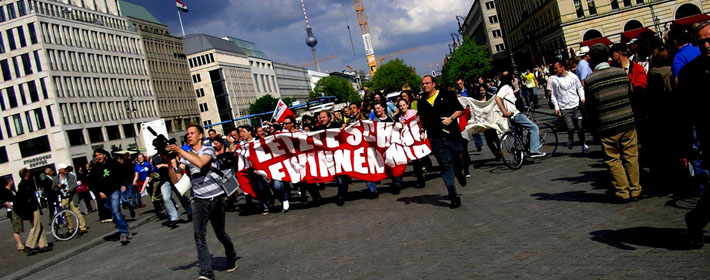What examples of progressive struggles can still nourish the imagination? Let us try to identify the specificity of two sources of inspiration: the alter-globalization and universal path on the one hand; the Zapatista and local way on the other hand.
 Various movements opposing transatlantic trade agreements punctuated the year 2016 with actions, sometimes spectacular, bringing together people from all sides. Through the latest study 2016 of the Justice and Peace Commission, we showed that farmers, students, SME owners, NGOs and trade union organizations, among others, stood up to the dangers posed by TTIP and CETA on democracy, social rights, the environment and the local economy. At a time when the European Parliament has just approved CETA, on February 13, what follow-up should be given to this movement which has been able to unite through large coalitions and great creativity? We are convinced that from this breeding ground of shared experiences must be able to germinate a struggle for one or more alternative social projects to neoliberal policies. It is important to associate a discourse of protest against these treaties with the affirmation or realization of positive projects. If most people no longer believe in the illusion of a great revolutionary evening that would turn the world upside down, what progressive and realistic perspectives can still nourish our imagination and guide us? In light of what we learn from examples of contemporary struggles over the last 25 years, two sources of inspiration with different approaches are available to citizens: the anti-globalization, universal and centripetal path on the one hand; the Zapatista way, local and centrifugal on the other hand. Let us try to understand the specificity of these approaches.
Various movements opposing transatlantic trade agreements punctuated the year 2016 with actions, sometimes spectacular, bringing together people from all sides. Through the latest study 2016 of the Justice and Peace Commission, we showed that farmers, students, SME owners, NGOs and trade union organizations, among others, stood up to the dangers posed by TTIP and CETA on democracy, social rights, the environment and the local economy. At a time when the European Parliament has just approved CETA, on February 13, what follow-up should be given to this movement which has been able to unite through large coalitions and great creativity? We are convinced that from this breeding ground of shared experiences must be able to germinate a struggle for one or more alternative social projects to neoliberal policies. It is important to associate a discourse of protest against these treaties with the affirmation or realization of positive projects. If most people no longer believe in the illusion of a great revolutionary evening that would turn the world upside down, what progressive and realistic perspectives can still nourish our imagination and guide us? In light of what we learn from examples of contemporary struggles over the last 25 years, two sources of inspiration with different approaches are available to citizens: the anti-globalization, universal and centripetal path on the one hand; the Zapatista way, local and centrifugal on the other hand. Let us try to understand the specificity of these approaches.
- Jérôme Baschet, Farewell to capitalism. Autonomy, society of good living and multiplicity of worlds, Paris, La Découverte, 2014.
- Bernard Duterme, The Zapatistas, a lasting rebellion, conference at ULB, January 28, 2016.
- Theotonio Dos Santos, Latin American social movements: from resistance to offensive?, in Left Movements and Powers in Latin America, Study Alternatives Sud, Éditions Syllepse, 2005.
- Hernán Ouviña, The new political radicalities in Latin America: Zapatistas, piqueteros and landless people, in Left Movements and Powers in Latin America, Study Alternatives Sud, Éditions Syllepse, 2005.
- Collective work, Men of corn, hearts of embers. Indian cultures in rebellion in Mexico, Montreuil, L'insomniaque, 2002.
- Valéry Witsel, The new citizen struggles. Put into perspective through the TTIP, Study by the Justice and Peace Commission, 2016.
Attachments
Notes[+]
| ↑1 | The Namur Declaration launched at the initiative of Paul Magnette, President of the Walloon Parliament, was signed in 2016 by renowned intellectuals such as the philosophers Philippe Van Parijs, Thomas Piketty and Philippe Maystadt. |
|---|---|
| ↑2 | Jérôme Baschet, Farewell to capitalism. Autonomy, society of good living and multiplicity of worlds, Paris, La Découverte, 2014. |
| ↑3 | Bernard Duterme, The Zapatistas, a lasting rebellion, conference at ULB, January 28, 2016. |






